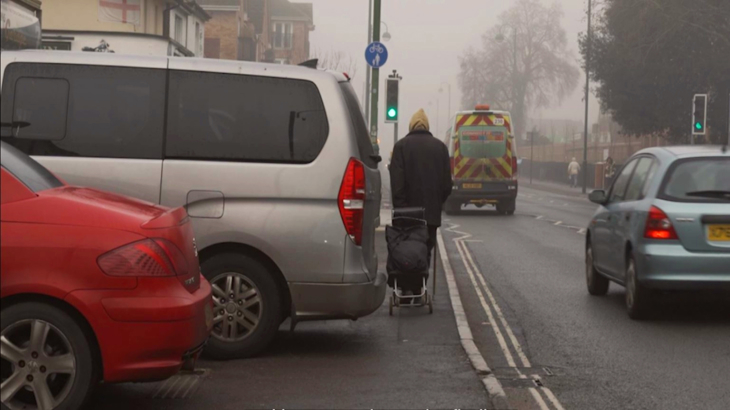22 November marks three years since the Department for Transport’s consultation on banning pavement parking closed. The 15,000 people who responded are still waiting for a response. In this blog, Tim Burns, Head of Policy at Sustrans, explains why the need for a ban on pavement parking to improve safety for everyone is still critical.

Parking vehicles on the pavement is not just inconvenient – it creates a hazard for people walking and wheeling. Credit: Toby Spearpoint/Sustrans
To make walking and wheeling a natural choice for journeys, it is critical that everyone feels safe and confident in their neighbourhoods.
However, cars parked on the pavement are a common occurrence across the country.
In many places it is seen as more socially acceptable to park on the pavement and block people walking and wheeling, than to park in the road and potentially slowing traffic.
Stop the danger
Parking vehicles on the pavement is not just inconvenient – it creates a hazard for people walking and wheeling.
Parking on the pavement puts people at a greater risk of collision and injury by forcing them into the road.
Pavement parking is particularly challenging for many disabled people, especially people with mobility, neurological or visual impairments, as well as children walking and in buggies.
The Highway Code is clear - vehicles should not park on the pavement but, outside of London, it is still legal. Councils have limited practical powers to stop this.
Today, is the third anniversary of the Government’s consultation on pavement parking closing.
Over 15,000 people took the time to respond to this consultation, demonstrating the public’s concern.
Give the people what they want
Surveys and polls repeatedly show overwhelming support for prohibiting pavement parking across the UK which would still allow exemptions on a necessary basis, for example, emergency vehicle access.
Sustrans’ Walking and Cycling Index showed that 65% of residents supported the prohibition of pavement parking (while only 16% oppose it).
68% of residents believe fewer vehicles parked on the pavement would help them walk or wheel more.1
Support rises even higher from disabled people (73%) as revealed by Sustrans’ Disabled Citizens Inquiry.
The Inquiry also revealed that over two-fifths of disabled people often experience problems reaching their destination.
The issue of pavement parking is important for everyone.
A recent Daily Express poll of over 4,000 readers, found 78% would like to see a ban on pavement parking.

Pavement parking is particularly challenging for many disabled people, especially people with mobility, neurological or visual impairments, as well as children walking and in buggies. Credit: Jon Bewley/Sustrans
The price is right
Scotland and Wales are taking positive action to clamp down on pavement parking, with Scotland introducing a nation-wide prohibition from December.
England lags behind and needs to catch up, for the benefit of everyone.
Prohibiting pavement parking is also relatively cheaper to implement than the costly maintenance and replacement of damaged paving, caused by pavement parking.
The charity Living Streets found trips and falls could be costing English taxpayers as much as half a billion pounds a year, while costing local authorities and the NHS millions more from personal injury claims and medical treatment.
Time to act
We welcomed the consultation three years ago on pavement parking from the Government and the positive messages we have seen since.
Of course, it’s been a challenging few years, but now is the time for Government to respond and to take action to improve the situation.
Sustrans will continue to call for action on pavement parking on behalf of people across the UK and we stand ready to work with the Government and our close partners to take positive action together.
1. Sustrans, (forthcoming) Walking and Cycling Index 2023. Figures are based on an independent and representative survey of 1,100 residents in 18 cities and city regions across the UK with a total sample size of over 20,000 people conducted by NatCen.





